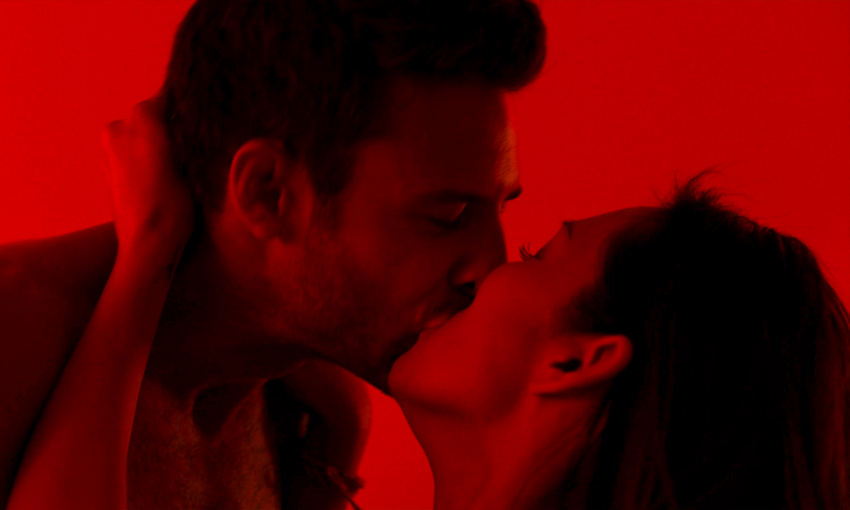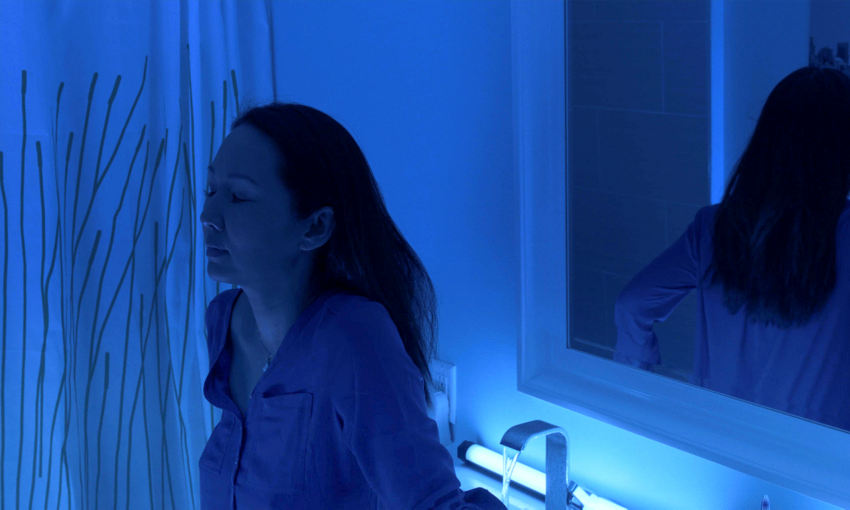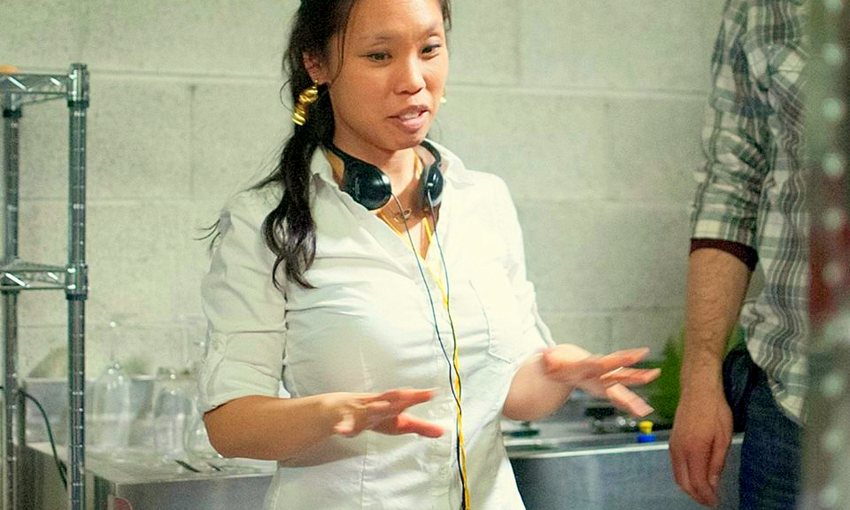
Steve Lund (Tyler) and Steph Song (Laina) in Affection (Dir. by Tricia Lee)
indieactivity: Give a background of your personal experience with the story, writing, production and marketing
Tricia Lee: As a director, I am lucky if I get to practice my craft once a year for a few days on set. So whenever, I meet a talented actor, I always offer to work with them on scenes, plays, auditions, so that I can also practice directing and learning the different styles of actors. I did this with my friend James Kyson, and we worked on a play he was starring in called Wild Goose Dreams. In the text, I found a really interesting theme about love that I wanted to explore. That was on a Friday. The next Monday, I wrote a script about that theme. The next day, I posted on Facebook that I wanted to shoot this film and quickly found a crew. We were shooting within a month and that was how Affection came to life!
While it is not auto-biographical (ie. I’m not bringing hot men home to sleep with every night), there is a lot of me in it. I do own 3 condos that I rented out on AirBNB and moved around in between them, and I do feel vulnerable about my aging ovaries. When I write, it always comes from a personal place.
As for marketing, we are just starting our festival circuit with its world premiere at the LA Shorts International Film Festival.
indieactivity: Did you start writing with a cast (You or any) in mind?
Tricia Lee: I did not have anyone in mind when writing. I like the characters to grow into who they want to be on the page before inhabiting them in a body and giving them a face. I am not an actor, so it definitely would not be me starring in it! But I did find the perfect people to play the characters of Laina and Tyler.

Steph Song (Laina) in Affection (Dir. by Tricia Lee)
Steph Song is an amazing dedicated and vulnerable actress that I had the honor of working with. I had first seen her work as the lead actress of Blood and Water. I’ve seen every episode of that show and she was so incredibly natural, I knew she was the right person to play the lead in my film. I was very lucky she quickly accepted and we quickly bonded over the character that has a lot of my own personal vulnerabilities in it.
Steve Lund had an older look than I had originally conceived the character to be but when his agent sent his portfolio to me, I knew immediately that I needed to change the role to fit him. I wrote Steve a personal letter to convince him to be in the film and he wrote me back the sweetest letter, accepting. I later found out that he had written the letter without even reading the script! You would recognize Steve from Bitten, Reign and Schitt’s Creek.
indieactivity: How long did you take to complete the script? (Do you have a writing process?)
Tricia Lee: This is the first short I’ve written in 7 years. My focus has been on directing feature films during that time and I usually work with a creative partner, Corey Brown, who has written all my features. I don’t have a writing process, this 10 page script just came out of me in one day. The first draft was finished by the end of that Monday. Of course, I went back and made revisions, and then we were shooting a month later.
indieactivity: When did you form your production company – and what was the motivation for its formation?
Tricia Lee: I formed Film Monkey Productions way back in 2006. After I graduated from film school, I applied to a bunch of grants to make a short film. I was selected to be a part of the CFTPA Corus Young Filmmaker Initiative and made my first short out of school called “Paper Tulips”. In order to receive the $20,000 grant, I needed to incorporate, and so my production company was born.
indieactivity: What was the first project out of the gate?
Tricia Lee: Before we made Paper Tulips, I actually shot a 3 minute short film on left over super 8 film stock called “Salad Days”. I asked my friends to send me their most vivid memory and David Bajurny, an actor in one of my student films sent me his memory about fishing with his dad. I was so moved by it, that I made a movie illustrating the memory.

Tricia Lee on the production set for Affection
indieactivity: During production, what scene (that made the cut) was the hardest to shoot?
Tricia Lee: Sex scenes are always hard to shoot because the actors are so vulnerable. I am so grateful that my actors were so open and willing to share themselves with me and the camera. It was the last scene we shot that day, so we were tired and it was getting late. We cleared the set, so only the people who were essential to shooting the scene were there and everyone else left the condo. We were able to get the scene in only a few takes.
indieactivity: What works better in this production that mightn’t have worked so well in the last one?
Tricia Lee: Well, my last short film was a sweet father-daughter short called Meeting Mommy. The adult content and the monochromatic lighting choices in this film probably would not have suited the style of the last film. That’s what’s so great about making movies, is that you can try out different styles and looks to tell different stories.
indieactivity: You produced and directed the film, what measure of input did it take to don these hats?
Tricia Lee: While I did do a lot of work producing the film and putting it together, I did not take a producing credit. My focus is always directing and I had help from Shonna Foster, Brian Quientero and Mike Annunziata to help put it together. Nonetheless, I had a lot of input into every aspect of the production from the creative to what food we needed to buy to feed people!
indieactivity: Is there anything about the independent filmmaking business you still struggle with?
Tricia Lee: Yes! I am working to get my next feature film off the ground. It is not easy to find the right producer, get people to invest money, attach name actors. Although I have made three features, I am always striving to get to the next level. It is never easy, but I love it and will keep doing what it takes.
indieactivity: Where do you think your strengths line as a filmmaker?
Tricia Lee: I am definitely more of an actor’s director rather than a technical director. I love getting to know actors, their acting style and approach, digging into the character, finding ways we relate to the character and making sure we create an authentic performance. I went to film school, so I do know about lenses and lighting. The best piece of advice I was ever given is that it doesn’t matter if you have $100 or $100 million, you can always choose how you frame a shot. It’s always great to remember that no matter what you are limited by, you can use the camera to tell the story.

Steve Lund (Tyler) and Steph Song (Laina) in Affection (Dir. by Tricia Lee)
indieactivity: Let’s talk finance, How did you finance the film?
Tricia Lee: I paid for it myself. It was a very low budget and I wanted to get the film made. The only reason it came together so fast is because I made that decision.
indieactivity: How much did you go over budget? How did you manage it?
Tricia Lee:: I never go over budget.
indieactivity: How important is marketing? Do you think a project can make any dent without it these days?
Tricia Lee: Marketing is important for sure. There are so many films being made these days, that simply making a film isn’t enough. You have to get it out there and let people know it exists! Publicity is one way and social media is great. I’m not a marketing guru and still have lots to learn myself about marketing to be honest. I am a filmmaker and I have focused on working on my craft. I know marketing is part of filmmaking now; I guess I should take a course on that and learn more about it!
indieactivity: Can you tell us about your marketing activities on the project – and how it’s gone for you?
Tricia Lee: I have hired a publicist – London Flair PR. They have been helpful at getting the film noticed by press and getting it reviewed, as well as interviews such as this one! It’s fantastic because it helps me reach an audience that my social media doesn’t even come close to touching! I make films to share them with people and I hope this will help the piece reach more people around the world.
indieactivity: What do you hope audiences get from your film?
Tricia Lee: I hope audiences get a glimpse into this character’s life: her thoughts, feelings and insecurities. I made this film to submit to a film competition with the theme of “Home”. I wanted to take an out-of-the-box approach to the theme of home. Seeing as I moved around between my condos, I hadn’t had a sense of home in a long time and I want audiences to experience this unique life that she lives. It is my take on the saying “home is where the heart is”.
indieactivity: What else have you got in the works?
Tricia Lee: I am continuing to develop projects and get them made. I am working with my long-time creative partner Corey Brown, who has written the last 3 features I’ve directed, on creating a sci-fi drama, a supernatural family adventure and a crime thriller feature script, as well as co-creating 2 sci-fi drama TV series concepts. We have signed a shopping agreement for one TV series with Big Vision Creative in New York. A short script I’ve written, OKAY ANNEX, has been selected to be a part of Hollyshorts in August. And a feature script I’ve written has been selected to participate in the Stowe Story Labs.
Follow Tricia Lee on Social Media
Website
IMDb
Facebook
Twitter
Instagram
LinkedIn
Vimeo
YouTube
Google+
Richard Green Documentary, ‘I Know Catherine, The Log Lady’: Premiere in NYC, LA May 9th
Lynchian Doc I Know Catherine, The Log Lady Makes Hollywood Premiere 4/17, Rollout to Follow
In Camera by Naqqash Khlalid Launch on VOD April 29
Naqqash Khlalid’s Directs Nabhan Rizwan. In Camera stars an EE BAFTA Rising Star Award Nominee.
2025 Philip K. Dick Sci-Fi Film Festival Award Winners Announced
Vanessa Ly’s Memories of the Future Awarded Best PKD Feature
Dreaming of You by Jack McCafferty Debuts VOD & DVD for April Release
Freestyle Acquires “Dreaming of You” for April 15th Release
Hello Stranger by Paul Raschid set for London Games Festival & BIFFF
The film Is set for an April 10th Premiere at The Genesis Cinema in London (LGF) and BIFFF
Daydreamers Official Trailer by Timothy Linh Bui: Released by Dark Star Pictures
Daydreamers Vietnamese Vampire Thriller – May 2nd release









